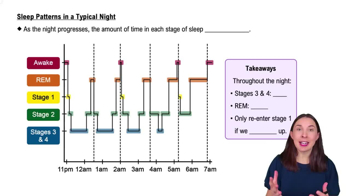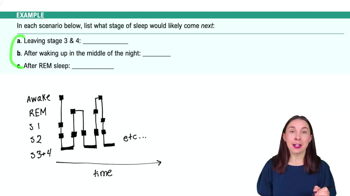Table of contents
- 1. Introduction to Psychology1h 43m
- 2. Psychology Research2h 20m
- 3. Biological Psychology2h 41m
- 4. Sensation and Perception28m
- 5. Consciousness and Sleep32m
- 6. Learning41m
- 7. Memory34m
- 8. Cognition37m
- 9. Emotion and Motivation35m
- 10. Developmental Psychology33m
- 11. Personality48m
- 12. Social Psychology41m
- 13. Stress and Health41m
- 14. Psychological Disorders44m
- 15. Treatment47m
5. Consciousness and Sleep
Sleep
Struggling with Psychology?
Join thousands of students who trust us to help them ace their exams!Watch the first videoMultiple Choice
Belen often experiences "sleep seizures" during the day. He probably suffers from
A
sleep apnea.
B
narcolepsy.
C
daytime sleep terrors.
D
REM rebound.
 Verified step by step guidance
Verified step by step guidance1
Begin by understanding the symptoms described: 'sleep seizures' during the day. This suggests sudden and uncontrollable episodes of sleep.
Review the definitions of the terms provided in the options: sleep apnea, narcolepsy, daytime sleep terrors, and REM rebound.
Sleep apnea is characterized by pauses in breathing during sleep, often leading to disrupted sleep but not typically 'sleep seizures' during the day.
Narcolepsy is a disorder characterized by excessive daytime sleepiness and sudden sleep attacks, which aligns with the description of 'sleep seizures'.
Daytime sleep terrors and REM rebound do not typically involve sudden daytime sleep episodes. Daytime sleep terrors are more related to fear during sleep, and REM rebound involves increased REM sleep after deprivation.

 3:25m
3:25mWatch next
Master Circadian Rhythms with a bite sized video explanation from Hannah Gordils
Start learningRelated Videos
Related Practice


































































































![Race, Genes and IQ Differences | Bret Weinstein [Mini Clip]](https://img.youtube.com/vi/IztL_m3pd70/mqdefault.jpg)



































































































